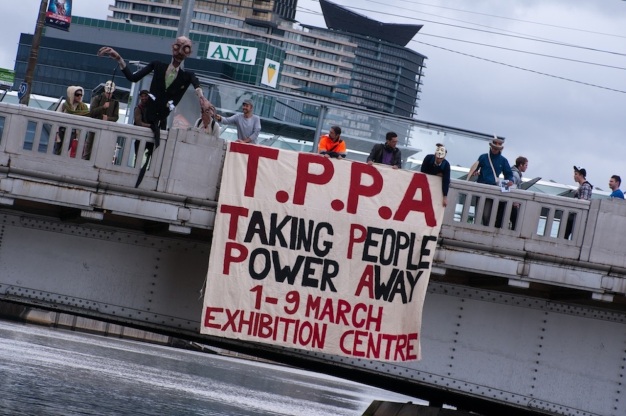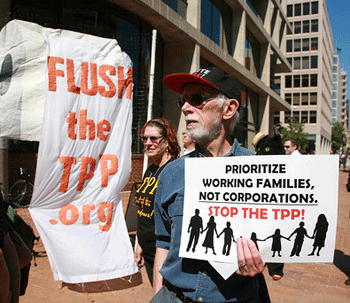Post-Standard
by Ursula Rozum
January 20, 2014
Any speck of democracy and sovereignty we the people have left in this country is under attack. The Trans-Pacific Partnership (TPP) is a new international trade pact crafted by multinational corporations and currently being negotiated in secret by the Office of the U.S. Trade Representative (USTR) along with 11 other foreign governments. Rep. Alan Grayson (D-Fla.) describes the agreement as “an attack on democratic governance” and “a punch in the face to the middle class of America.”
The TPP began as trade talks among a few Pacific Rim countries, but has been expanded to include Australia, Brunei, Chile, Malaysia, New Zealand, Peru, Singapore, Vietnam, Mexico, and Canada, with the possibility of further expansion to Japan, Korea, and China. While the public and media are not allowed to see the text, and members of Congress only receive limited, heavily restricted access, 600 corporations have been advising President Obama and suggesting amendments as they have full access to the documents. These include Monsanto, Wal-Mart, Bank of America, JP Morgan, Pfizer, Cargill, Exxon-Mobil, and Chevron — which in my view are some of the worst corporate citizens in the U.S.
If ratified, the TPP would establish a system of international tribunals (if that sounds creepy, it’s because it is) allowing corporations to challenge the laws, regulations and even court decisions of any member country – including local, county and state laws – if they are deemed to adversely impact the corporation’s expected profits.
Under the TPP’s “investor-state” provision, corporations would even be allowed to file preemptive lawsuits against proposed government actions before they are undertaken. In New York, for example, this could bring harsh challenges to municipalities that have passed anti-fracking legislation or enacted consumer protection laws.
Currently, 178 New York municipalities have local ban on hydraulic fracturing. If the TPP includes “investor-state” provisions similar to those part of the North American Free Trade Agreement, gas companies could sue the U.S. for loss of profits resulting from local bans, similarly to what is currently happening as a result of Quebec’s moratorium on fracking. A U.S.-based firm, Lone Pine Resources Inc., is suing the government of Canada for $250 million. If that’s not a gross attack of the sovereign people of Quebec, I don’t know what is.
On Jan. 9, a bipartisan group of members of Congress announced they were introducing “fast track” trade promotion legislation, setting the stage for bringing up the TPP for expected passage in the near future. “Fast Track” gives the White House authority to negotiate and sign the trade agreement without Congressional oversight. Lawmakers won’t be able to analyze or amend treaty provisions; they would only be able to vote “yes” or “no” to ratify the entire treaty.
We need to make sure that Congress does not abrogate its Constitutional responsibility to regulate trade and protect our national sovereignty.
Provisions in the TPP threaten our local economy and our growing buy local movement. That’s why in 2010 Sen. Kirsten Gillibrand (D-NY) expressed concern about the TPP based on the impact it could have on New York’s dairy farmers if local markets were to be flooded by dairy products from New Zealand. In a press release, Gillibrand stated, “given that the U.S. dairy industry is currently facing a protracted pricing crisis, an improperly crafted deal could deal a severe blow to the industry. I am especially concerned about the long-term national security implications of losing our ability to produce food here at home. We cannot outsource our dairy production to the lowest global bidder without risking the safety of our health and our local economies”
Gillibrand might as well be talking about NAFTA and its impact on Mexico’s corn growers. Millions of Mexican farmers who could no longer compete with heavily subsidized U.S. crops were displaced from their land, setting off a wave of migration northward. This migration crisis triggered by NAFTA highlights the crux of the problem with the “free trade” model, which is that corporations and capital can freely cross boarders in search of resources and markets while individuals cannot freely move to adjust to new economic realities. Many in Central New York are familiar with the negative impacts of the North American Free Trade Agreement (NAFTA), passed in the early 1990s. NAFTA caused the elimination of hundreds of thousands of U.S. jobs. Central New York was especially hard hit. Syracuse lost thousands of jobs to Mexico and Canada in the first six years of NAFTA. In Cortland, Smith Corona closed it typewriter factory and moved it to Tijuana, outsourcing 874 jobs.
The TPP will make it more difficult for countries to adopt and maintain strong food safety regulations governing pesticides, food additives and genetically modified organisms (GMOs) by granting so-called “life sciences” corporations unprecedented power to erect barriers to those regulations. Under past free-trade agreements, consumer right-to-know rules requiring product labeling have been attacked and dismantled.
The trade policies being promoted under the TPP would inhibit the ability of elected governments to make their own decisions, based on local conditions and markets, whether about farming practices, labor standards, environmental protections, intellectual property or anything else related to trade.
The TPP is being negotiated under unprecedented secrecy because previous attempts to pass similar “free trade” pacts have been met with widespread public opposition. And what’s scary is the bipartisan consensus among our country’s political elites pushing these trade deals, from Clinton to Bush and Obama and the bipartisan free-traders pushing to put the TPP on fast track.
Expansion of unregulated, free trade isn’t inevitable. Grassroots movements in the past have successfully stopped the Multilateral Agreement on Investment, the Free Trade Area of the Americas, the expansion of the World Trade Organization, and others. Today, we the people need to make sure that Congress does not abrogate its Constitutional responsibility to regulate trade and protect our national sovereignty.
Ursula Rozum writes a monthly guest columnist for The Post-Standard and syracuse.com

